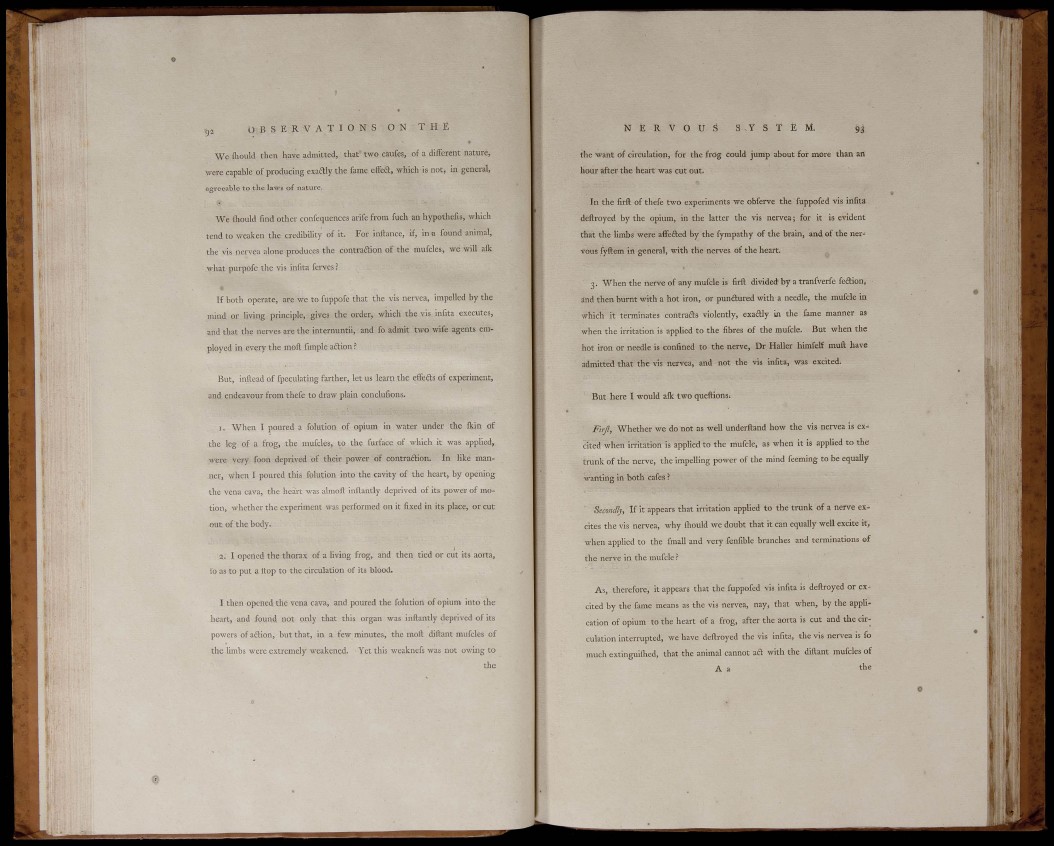
; • ,. •
i ir , ' • ,
gì o b s e r v a t i o n s on t h è
W e fliould then have admitted, that two caufes, of a different nature,
were capabic of producing exafUy the fame effed, which is not , in general,
agreeable t o the laws of nature.
W e ihould find other confequences arife f r om fuch an hypothefis, which
t e n d to weaken the credibility of it. For inftance, if, in a found animal,
t h e vis nervea alone produces the contraflion of the mufcles, we will aflc
what purpofe the vis infita ferves ?
If bot h operate, are wc to fuppofe that the vis nervea, impelled by the
mind or living principle, gives the order, which the vis infita executes,
and that the nerves are the internuntii, and fo admit two wife agents employed
in every the moft fimple adion ?
But, inilead of fpeculating far ther , let us learn the effeds of experiment,
and endeavour f rom thefe t o draw plain conclufions.
1. When I poured a folution of opium in water under the ikin of
t h e leg of a frog, the mufcles, to the furface of which it was applied,
were very foon deprived of their power of contradlion. In like manner,
when I poured this folution into the cavity of the heart, by opening
t h e vena cava, the heart was almoft inftant l y deprived of its power of motion,
whether the experiment was per formed on it fixed in its place, or cut
out of the body.
2. I opened the thorax of a living frog, and then tied or cut its aorta,
fo as t o put a ilop t o the circulation of its blood.
I then opened the vena cava, and poured the folution of opium into the
heart, and found not only that this organ was inftantly deprived of its
powers ofadion, but that , in a few minutes, the moil diftant mufcles of
t h e limbs were extremel y weakened. Yet this weaknefs was not owing to
t h e
N E R V O U S S Y S T E M . 93
t h e want of circulation, for the frog could jump about for mor e than an
h o u r after t h e heart was cut out.
I n the firft of thefe two experiments we obferve the fuppofed vis infita
deftroyed by the opium, in the latter the vis nervea; for it is evident
t h a t the limbs wer e affefled b y the fympathy of the brain, and of the nervous
fyftem in general, wi t h the nerves of the heart.
3. Whe n the nerve of any mufcle is firft divided by a t ranfver f e fe£tion,
and then burnt wi t h a hot iron, or punf lured wi t h a needle, the mufcle in
which it terminates contrafts violently, exailly in the fame manner as
when the irritation is applied to the fibres of the mufcle. But when the
hot iron or needle is confined to the nerve, Dr Haller himfelf muft have
admitted that the vis nervea, and not the vis infita, was excited.
C , i1
But here I would aik two queftions.
Firjl, Whether we do n o t as well underftand how the vis nervea is excited
when irritation is applied t o the mufcle, as when it is applied to the
t r u n k of the nerve, the impelhng power of the mind feeming to be equally
w a n t i n g in bot h cafes ?
Secondly, If it appears that irritation applied to the trunk of a nerve excites
the vis nervea, why lliould we doubt that it can equally well excite it,
when applied to the fmall and very fenfible branches and terminations of
t h e nerve in the mufcle ?
As, therefore, it appears that the fuppofed vis infita is deftroyed or excited
by the fame means as the vis nervea, nay, that when, by the application
of opium to the heart of a frog, after the aorta is cut and the circulation
interrupted, we have deftroyed the vis infita, tlie vis nervea is fo
much extinguiihcd, that the animal cannot a d with the diftant mufcles of
A a th e